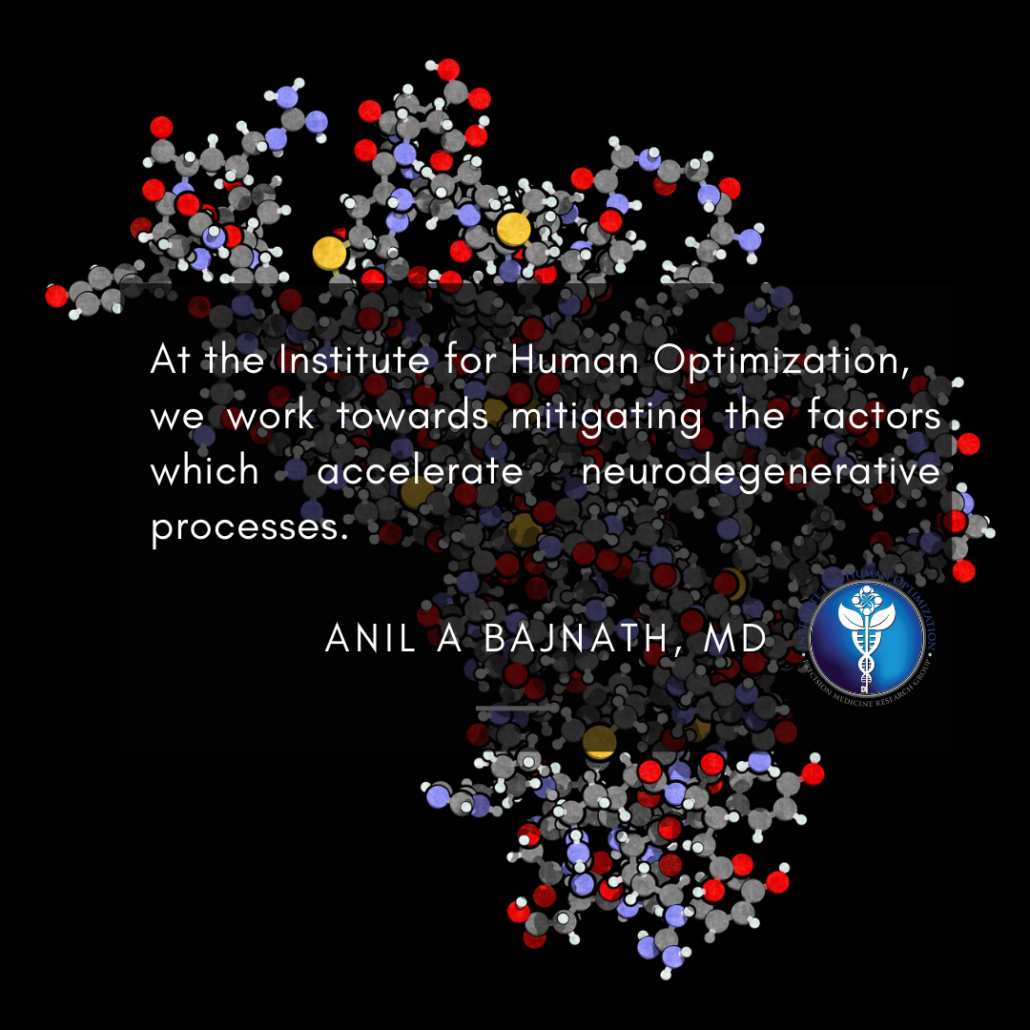Your brain is complicated; even scientists don’t understand how it all works. There are physical structures, electric impulses, chemical reactions, and cellular communication systems that go far beyond any computer ever dreamed of. At the Institute for Human Optimization, we take brain health seriously and aim to educate our patients about how the brain works and how to keep it operating well into old age. In part two of our Brain Health series, we discussed neurotransmitters and how they affect your mood, focus, and overall health. This week, we’re covering what happens to the brain as we age and proactive steps you can take to decrease your risk for neural-degenerative diseases.
When you think about aging well, what does it look like? Are you able to run? Touch your toes? Move around unassisted? Do you want radiant skin? Clear eyes? A nice smile?
Lifespan and healthspan are two different discussions. You can lengthen your life span and live to be a hundred, but what’s the benefit if the last twenty years are spent in a cognitive haze?
Transneuronal degeneration is when neurons lose a degree of intracellular proteins and can no longer maintain their normal transmembrane potential. This is the pathological process that creates the cognitive decline we see in Alzheimer’s and dementia. The loss of intracellular machinery leads to neurons that are quick to be excited, and also quickly fatigued.
As we age our brains begin to shrink, especially in the frontal cortex which is the part of the brain that handles reasoning, personality, decision making, and social behavior. Memory decline is another symptom we associate with aging and may be caused by the brain attempting to compensate for other areas experiencing weakened functions.
It’s important to know that while chronological aging is as irreversible as time itself, it is possible to reverse biological age and reduce the possibility of suffering from dementia and other neurodegenerative diseases.
Promoters of Neuronal Degeneration
Age itself is never the reason for a disease, rather, it is the snowball effect of all the variables in a person’s life that attributes to the length of their healthspan. Like any machine, the brain and body will break down from constant wear and tear without maintenance.
In the case of neuronal degeneration and the many diseases it leads to, there are a variety of factors that can accelerate the process:
- Lack of Neuronal Stimulation– A lazy brain tends to stay a lazy brain.
- Inflammatory Responses– Eating a diet full of inflammatory foods puts your body in a constant state of inflammation, which can lead to neuron degeneration and death.
- Microglia Activation – Microglial cells are your immune system’s trash collectors. They’re responsible for clearing out cellular debris and mediating immune responses in the central nervous system. If your body is in a constant state of chronic neuro-inflammation (the underlying cause of most neurodegenerative diseases), too many microglia are activated at once, leading to more inflammation and neuron death.
- Blood Sugar Dysregulation – It’s well-documented that people with Type-2 diabetes have a higher chance of developing neurodegenerative diseases due to insulin being neuro-protective.
- Methylation Imbalances – Methylation is the atomic process that essentially turns on and off your biological systems. It helps your metabolism, DNA production, neurotransmitter production, liver health, detoxification, and so much more. When this process becomes imbalanced, serious health problems can arise.
- Deficiency of Nutrients– Eating a balanced diet is the best way to ward off cognitive illnesses. Many studies show “a diet that is rich in omega-3 fatty acids supports cognitive processes in humans and upregulates genes that are important for maintaining synaptic function and plasticity in rodents. In turn, diets that are high in saturated fat are becoming notorious for reducing molecular substrates that support cognitive processing and increase the risk of neurological dysfunction in both humans and animals.”
Signs of an Aging Brain
Most researchers agree your brain starts to show its first signs of degeneration around age thirty with beginning signs of cognitive decline after fifty.
The earliest signs of an aging brain are:
- Fatigue when performing cognitive activities such as driving, reading, and learning.
- Depression, a sign of unhealthy neuron activity or imbalanced neurotransmitters.
- Poor digestive function as around 90% of the brain’s output is responsible for keeping the digestive system functioning properly.
Moderate signs of an aging brain are:
- An inability to focus or concentrate.
- Difficulty learning new tasks.
- Chronic constipation as a result of intestinal overgrowth and digestive enzyme insufficiency.
- Increased blood pressure, increased resting heart rate, and poor blood flow resulting from overactivity of the sympathetic nervous system.
Significant brain aging may cause:
- The inability to work professionally due to cognitive difficulties.
- An inability to appreciate life.
- An inability to perceive your own neurological loss.
- Tremors
- Increased difficulty in finding directions.
And severe brain aging, correlated with neurological disease, may cause:
- Uncontrolled bowel movements
- Bowel obstruction and inability to digest food.
- Inability to smell, taste, or develop social relationships.
- Total dependence on family and medical staff for daily functions.
6 Steps for Preventing Neurodegeneration
Despite what you might think, aging and neurodegeneration doesn’t have to go hand in hand.
Blue zones are locations on the planet where people are living longer than everyone else and recently, a team of researchers set out to discover what they were doing right.
“In the blue zones region of Ikaria, Greece, dementia among people over 85 is rare — over 75 percent less common than it is in the United States. (About half of Americans over 85 years old show signs of Alzheimer’s disease.)”
Blue Zones. “Diet and Dementia: What Foods Increase or Decrease Alzheimer’s Risk?”
These blue zones show that with a variety of lifestyle changes (what Blue Zones’ founder calls the Power 9) aging doesn’t have to mean losing your mental faculties. With the knowledge of how your brain works and some simple tips, you can take proactive steps towards improving your own neural health and keeping a functioning mind through the years.
- Normalize blood sugar imbalances and promote optimal mitochondrial function. This means avoiding foods and beverages that will spike your blood sugar levels and throw off your insulin production. Stay away from sweets, sodas, and processed foods. Stick with natural, whole foods like lean meat, eggs, fruits, vegetables, and nuts.
- Improve Phase I and II detoxification. This is all about helping your liver do its job of removing toxins from your body. The best way to aid this process is by reducing the toxins you’re putting in so your liver isn’t overloaded. Eating organic foods, avoiding environmental toxins (like smoke), and supplementing with key nutrients all help improve Phase I and II detoxes.
- Optimize essential fatty acid metabolism. You’ll find most preventative medicine focused heavily on diet and exercise, and this is tip is no different. Studies show “maximal rates of fat oxidation have been shown to be reached at intensities between 59% and 64% of maximum oxygen consumption in trained individuals and between 47% and 52% of maximum oxygen consumption in a large sample of the general population.” This means steady, consistent exercise to get your heart rate up can greatly reduce the symptoms of metabolic diseases such as type 2 diabetes and obesity.
- Optimize glutathione production. Glutathione is an antioxidant produced in cells. Having a reduced amount can affect many health markers and even increase the risk of Parkinson’s disease. Eating plants with natural sulfur such as broccoli, bok choy, cauliflower, and legumes can boost glutathione production. Getting quality sleep also helps optimize glutathione production.
- Optimize gastrointestinal pathogens. There is always something growing in your stomach. Some of its helpful. some of it may be harmful. The best way to keep your gastro-flora healthy is by eating whole foods, including fermented foods such as kimchi and kombucha, or supplementing with a quality probiotic formula. For the full scoop on gut bacteria, check out our “Keeping a Healthy Microbiome” article.
- Optimize methylation. Methylation is the atomic process that turns on and off your biological systems. It helps your metabolism, DNA production, neurotransmitter production, liver health, detoxification, and many other mechanisms. You can optimize methylation in your own body by adding key nutrients such as folate, choline, and B vitamins into your diet.
At the Institute for Human Optimization, we believe brain aging doesn’t have to be a part of chronological aging. It all begins with you and your lifestyle choices. We strive to give our patients personalized preventative care to keep their minds sharp as they age. To discuss how we can help you on your journey to a longer healthspan, schedule a discovery call today.


